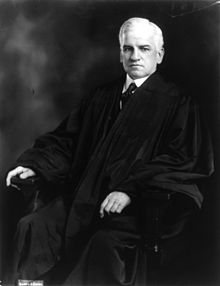John Hessin Clarke
| John Clarke | |
|---|---|
 |
|
| Associate Justice of the Supreme Court of the United States | |
|
In office July 24, 1916 – September 18, 1922 |
|
| Nominated by | Woodrow Wilson |
| Preceded by | Charles Hughes |
| Succeeded by | George Sutherland |
| Judge of the United States District Court for the Northern District of Ohio | |
|
In office July 21, 1914 – July 24, 1916 |
|
| Nominated by | Woodrow Wilson |
| Preceded by | William Day |
| Succeeded by | David Westenhaver |
| Personal details | |
| Born |
September 18, 1857 New Lisbon, Ohio, U.S. (now Lisbon) |
| Died | March 22, 1945 (aged 87) San Diego, California, U.S. |
| Political party | Democratic |
| Education | Case Western Reserve University (BA) |
John Hessin Clarke (September 18, 1857 – March 22, 1945) was an American lawyer and judge who served as an Associate Justice of the United States Supreme Court from 1916 to 1922.
Born in New Lisbon, Ohio, Clarke was the third child and only son of John Clarke, a lawyer and judge, and his wife Melissa Hessin. He attended New Lisbon High School and Western Reserve College, where he became a member of Delta Kappa Epsilon Fraternity. He graduated Phi Beta Kappa in 1877. Clarke did not attend law school but studied the law under his father's direction and passed the bar exam cum laude in 1878.
After practicing law in New Lisbon for two years, Clarke moved to Youngstown, where he purchased a half-share in the Youngstown Vindicator. The Vindicator was a Democratic newspaper and Clarke, a reform-minded Bourbon Democrat, wrote several articles opposing the growing power of corporate monopolies and promoting such causes as civil-service reform. He also became involved in local party politics and civic causes. His efforts to prevent Calvin S. Brice's renomination as the party's candidate for the United States Senate in 1894 ended in failure, but he worked successfully to oppose the election of a Republican candidate for mayor of Youngstown who was a member of the American Protective Association. A "gold bug" in 1896, Clarke's opposition to William Jennings Bryan's nomination as the Democratic Party's presidential candidate was so great that he bolted the party and participated in the subsequent "Gold Bug" convention in Indianapolis that nominated Senator John M. Palmer later that year.
...
Wikipedia
